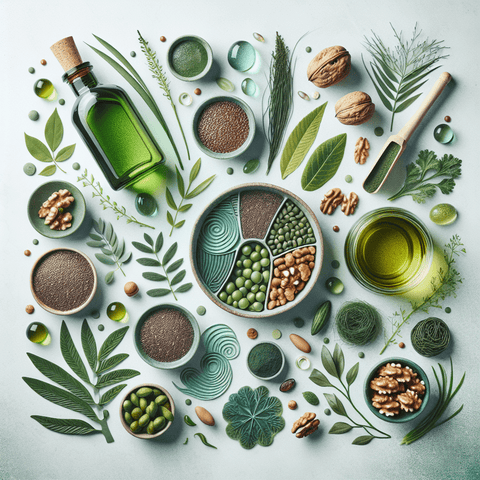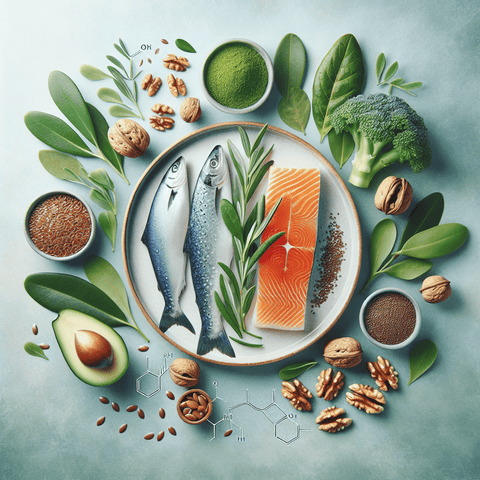Introduction
Omega-3 fatty acids play a vital role in maintaining overall health and wellness. Widely known for their support for cardiovascular function, neurological development, and anti-inflammatory properties, omega-3s are essential fats our bodies need but cannot produce efficiently on their own. While fish and other seafood have long been considered the go-to sources for omega-3s, the interest in plant-based sources continues to rise, fueled by the growing popularity of veganism, vegetarianism, and environmentally conscious lifestyles.
For individuals who follow a plant-based diet, understanding how to get adequate omega-3s through plants is crucial. Fortunately, nature offers a variety of seeds, nuts, algae, and legumes that are excellent sources of alpha-linolenic acid (ALA)—the plant-based form of omega-3. Additionally, with the advent of quality vegan supplements, obtaining the more bioavailable forms of EPA and DHA has become easier than ever.
This blog post aims to explore the top plant-based sources of omega-3 fatty acids, analyzing their nutritional profiles, how they contribute to health, and how plant-based omega-3 supplements serve as powerful allies in achieving a balanced diet. Whether you're fully plant-based or seeking to diversify your nutritional intake, this comprehensive guide will help you seamlessly integrate omega-3-rich foods and products into your lifestyle.
1. Plant-based Omega-3: The Cornerstone of Vegan Nutritional Supplements
Omega-3 fatty acids are a group of polyunsaturated fats that include alpha-linolenic acid (ALA), eicosapentaenoic acid (EPA), and docosahexaenoic acid (DHA). Each of these plays unique roles in the human body— from supporting brain and eye development to reducing inflammation and potentially contributing to cardiovascular wellness. While fish oil is a direct source of EPA and DHA, plant-based diets mostly provide ALA. The body can convert ALA into EPA and DHA, but the conversion is inefficient, typically ranging between 5-15% depending on individual factors such as age, gender, and genetics.
For vegans and vegetarians, this inefficiency poses a challenge. Without consuming fish or fish oil, it becomes harder to achieve optimal EPA and DHA levels. This is where plant-based omega-3 nutritional supplements become a cornerstone for health-conscious consumers. Vegan omega-3 supplements—particularly those derived from microalgae—offer a direct source of EPA and DHA that bypass the need for conversion.
Such supplements are gaining traction among health stores and online retailers like Topvitamine, which provides a thoughtfully curated collection of vegan-friendly omega-3 products. For individuals aiming to support joint mobility, cognitive performance, or heart function—without compromising their ethical beliefs or dietary preferences—turning to algae-based DHA and EPA supplements presents an effective, sustainable solution.
Integrating these supplements with omega-3-rich foods can enhance the total benefit. When paired with a diet abundant in seeds, nuts, and nourishing greens, a well-rounded strategy can help close the nutritional gap and ensure long-term wellness for plant-based eaters.
2. Vegan Omega-3 Sources: Seeds, Nuts, and More
Plant-based omega-3 sources are not only nutritious but also versatile and easy to integrate into everyday meals. Among the most prominent contributors to ALA intake are flaxseeds, chia seeds, walnuts, and hemp seeds. These nourish the body with more than just essential fatty acids—they’re packed with dietary fiber, protein, antioxidants, and other phytonutrients.
Flaxseeds and Flaxseed Oil: Flaxseeds are arguably the richest plant-based source of ALA omega-3s. Just one tablespoon of ground flaxseed provides about 1.6 grams of ALA, which is more than the daily recommended intake for most adults. Ground flaxseed is preferred over whole seeds for its better digestibility and nutrient absorption. Flaxseed oil, a concentrated form, offers an even higher ALA content, making it a powerful ingredient in smoothies, salad dressings, or supplement capsules.
Chia Seeds: Another omega-3 powerhouse, chia seeds deliver around 2.5 grams of ALA per tablespoon. Their gel-like consistency when soaked makes them a popular ingredient in puddings, oatmeal, and baked goods. In addition to omega-3, chia seeds offer soluble fiber and plant-based protein, making them a comprehensive superfood.
Walnuts: A perfect crunchy snack with plant-based omega-3s, walnuts contain approximately 2.5 grams of ALA per 28-gram serving (about a handful). They're convenient, non-perishable, and beneficial for heart health. Walnuts can be combined with fruits, tossed into salads, or ground into sauces for added flavor and nutrition.
Hemp Seeds and Hemp Seed Oil: Hemp seeds offer a balanced omega-6 to omega-3 ratio of roughly 3:1, which aligns well with recommended dietary ratios. They provide about 1 gram of ALA per tablespoon, along with complete protein and essential minerals like magnesium, zinc, and iron. Hemp seed oil, while not suitable for cooking at high temperatures due to its low smoke point, is ideal for drizzling over salads or cold dishes.
Dietary supplements featuring these seeds are growing increasingly popular. Brands sold on health-focused sites such as Topvitamine often combine them with other essential micronutrients, such as magnesium, for enhanced function and absorption. This layered approach not only boosts omega-3 intake but also promotes overall wellness by supporting muscle and bone health.
By incorporating these foods into your daily dietary routine—be it through smoothie bowls, trail mixes, or nutritional bars—you can enjoy a steady intake of omega-3s in a highly bioavailable and digestible form.
3. Plant-based Omega-3 Fatty Acids: The Essential Nutrients for Long-Term Wellness
Understanding the different types of omega-3s is essential for maintaining long-term health on a plant-based diet. As stated before, plant-based foods naturally offer ALA (alpha-linolenic acid), but for robust cognitive and cardiovascular support, EPA and DHA are often required too. While the human body can convert ALA into EPA and DHA, the rate of conversion remains low. Therefore, relying solely on ALA without supplementation can leave gaps in your nutritional profile.
ALA is primarily metabolized in the liver. Gender greatly influences this process—women, particularly during pregnancy, have a greater capacity to convert ALA to DHA, possibly due to hormonal factors. However, for most individuals, only a small fraction of ALA is converted into the long-chain fatty acids EPA and DHA. This means that while eating flax or chia seeds is a positive step, it's often not sufficient to reach optimal levels of the longer-chain omega-3s.
To optimize your omega-3 intake, consider combining ALA-rich foods with high-quality microalgae-based supplements. Algae provide a clean and sustainable source of EPA and DHA without the risk of marine-derived contaminants such as mercury or PCBs. Fortified plant-based milks and foods can also help bridge the nutritional gap.
Reputable providers like Topvitamine offer a diverse range of vegan-friendly omega-3 products derived from algae, which are ideal for those avoiding animal-derived supplements. Whether in oil or capsule form, these products ensure that you meet your daily intake requirements of EPA and DHA, thus supporting heart, brain, and eye functionality over time.
Being strategic about pairing ALA-rich foods with EPA and DHA supplements can dramatically improve your wellness trajectory. This comprehensive approach ensures both immediate nutritional support and long-term health advantages, particularly for people adhering to vegan or vegetarian diets.
4. Plant-Derived Omega-3 Rich Foods: Powerhouses of Nutrition
Although seeds and nuts dominate the ALA category, certain marine plants—namely algae and seaweed—offer unique access to EPA and DHA straight from plant origins. These are the primary sources of long-chain omega-3s in the marine food chain, consumed by smaller fish and accumulated in larger predators like salmon and tuna. By going directly to the source, plant-based eaters can bypass animal consumption while still accessing vital nutrients.
Microalgae and Algae Oil: Microalgae strains such as Schizochytrium and Nannochloropsis are cultivated specifically for omega-3-rich oils. Unlike fish oil, algae oil is vegan, sustainable, and free from toxins typical of marine ecosystems. It provides direct sources of both EPA and DHA, which are critical in maintaining brain plasticity, vision, and heart function.
Spirulina and Chlorella: While these blue-green algae are not significant sources of EPA and DHA, they do offer minor amounts of ALA and a bounty of additional nutrients, including protein, B vitamins, and antioxidants. Their comprehensive profile makes them excellent support supplements, though they should not be solely relied upon for omega-3 intake.
Edible Seaweed Varieties: Nori, wakame, and kelp are known staples in East Asian cuisines. These sea vegetables offer trace but consistent amounts of omega-3 fats, plus iodine, calcium, and bioactive phytochemicals. Though the EPA content is low, regular inclusion in the diet contributes positively to overall micronutrient diversity.
Plant-based omega-3 supplements derived from algae can be easily found on platforms like Topvitamine. These supplements have made it possible for plant-based eaters and people with fish allergies to maintain essential fatty acid consumption without compromise.
Incorporating diverse algae-based ingredients into your meal planning—be it through powdered forms, supplements, or whole foods—can significantly contribute to achieving a full spectrum of omega-3 intake essential for long-term vitality.
5. Plant-Based ALA Sources: The Flexible Options for Vegetarians and Vegans
Alpha-linolenic acid (ALA) is the most accessible and abundant form of omega-3 in the plant kingdom. Found in seeds, nuts, legumes, and some leafy greens, ALA serves as the precursor to longer-chain omega-3 fatty acids. While the conversion to EPA and DHA is limited, maintaining a high intake of ALA can still deliver health-supporting benefits and form a strong dietary foundation.
Top foods rich in ALA include:
- Flaxseeds — 1 tbsp ground: ~1.6g ALA
- Chia seeds — 1 tbsp: ~2.5g ALA
- Hemp seeds — 1 tbsp: ~1g ALA
- Walnuts — 28g serving: ~2.5g ALA
To maximize your ALA intake, consider innovative and delicious integrations into your meals. A spoonful of ground flax or chia can be added to your morning cereal or smoothie. Hemp seeds can be sprinkled on avocado toast, blended into pesto sauces, or baked into protein bars. Walnuts, in turn, can become the base of plant-based meatballs or be enjoyed as a snack throughout the day.
Though rich in ALA, these sources should ideally be complemented with DHA and EPA for holistic support. That’s why supplementing with products from Topvitamine’s omega-3 range is so essential; they help balance your intake for optimal body function.
Whether you’re vegetarian, vegan, or simply looking to cut back on animal products, plant-based ALA sources are flexible additions to your diet with minimal prep and maximum benefit.
6. Top Plant Omega-3 Foods: The Definitive List for Your Dietary and Supplement Needs
Here’s a summarized list of the most effective plant-based omega-3 fatty acid sources for optimizing your diet or supplement regimen:
- Flaxseeds & Flaxseed Oil: Excellent for baking and smoothies, flaxseed oil is also available as a supplement.
- Chia Seeds: Ideal for puddings, oatmeal, and vegan baking.
- Walnuts: The perfect ALA-rich snack and salad topping.
- Hemp Seeds & Hemp Oil: Great for nut butters, smoothies, and supplementation.
- Edible Seaweeds: Nori, kelp, and wakame for trace omega-3s and marine minerals.
- Microalgal Oils: The only plant-based supplements that provide both DHA and EPA.
As for choosing supplements, remember to evaluate brands based on purity, sustainability, and bioavailability. The curated selection from Topvitamine ensures access to top-tier plant-based omega-3 options backed by scientific research and stringent quality standards.
Conclusion
In the realm of plant-based nutrition, obtaining sufficient omega-3s is both essential and achievable. While challenges do exist due to the ALA conversion bottleneck, the combined power of strategic food choices and targeted supplementation offers a viable solution. Flaxseeds, chia, walnuts, hemp, seaweeds, and algae-based oils not only provide robust nutritional profiles but also support broader dietary goals like sustainability and animal welfare.
When appropriately integrated, these plant-based foods and high-quality supplements ensure that vegans, vegetarians, and health enthusiasts alike can enjoy the broad-spectrum benefits of omega-3 fatty acids. The key lies in consistency and variety – ensuring your weekly meal plans are rich in ALA options and reinforced with direct EPA and DHA sources.
With the help of reputable platforms such as Topvitamine, making the transition to an omega-3-rich plant-based lifestyle becomes not only simple but also deeply rewarding for long-term health.
Q&A Section
Q: What is the best plant-based source of omega-3s?
A: Flaxseeds are among the richest plant-based sources of ALA, providing about 1.6g per tablespoon of ground seed.
Q: Can the body convert ALA into EPA and DHA effectively?
A: The conversion rate of ALA to EPA and DHA is low (~5–15%), so supplementation with algae-derived omega-3s is recommended.
Q: Are algae-based supplements a good alternative to fish oil?
A: Yes. Algae-based supplements provide clean, sustainable, and vegan sources of EPA and DHA, serving as a direct replacement for fish oil.
Q: How can I add more ALA into my diet?
A: Add ground flaxseeds to smoothies, use chia seeds in puddings, snack on walnuts, and sprinkle hemp seeds over meals.
Q: Where can I find high-quality plant-based omega-3 supplements?
A: You can explore premium-grade vegan omega-3 options at Topvitamine.
Important Keywords
- plant-based omega-3
- vegan omega-3 sources
- flaxseeds omega-3
- chia seeds ALA
- walnuts omega-3
- hemp seeds omega-3
- algal oil supplements
- microalgae EPA DHA
- plant-based nutrition
- omega-3 supplements for vegans



